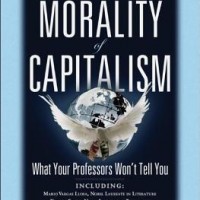Capitalism vs. the Free Market, by Ivan Pongracic.
Greedy bankers, overpaid executives, anaemic growth, the stubbornly high unemployment—these are just a few of the things that have lately driven protesters on to the streets and caused the wider public in the developed world to become disgruntled about capitalism. The system, in all its different varieties, is widely perceived to be failing to deliver.”
This is how, in January of 2012, the Financial Times started its series “Capitalism in Crisis” (italics are mine). Even worse, the introductory article then continued, the above mentioned villains simply bought the politicians and “bought themselves protection from proper societal accountability.” So for the next four weeks, economists, politicians, editorial writers, and just about anybody else, attacked or defended something called “capitalism,” trying to offer explanations for what we have experienced in the last several years.
Two books reviewed here are, in a way, the continuation of this same battle. The Morality of Capitalism: What Your Professors Won’t Tell You is a short book edited by Tom G. Palmer, of the Cato Institute but also of Atlas Network and Students for Liberty. It consists of his Introduction and fourteen essays by fourteen different writers, all of them categorically defending capitalism as the best and most moral system of all economic systems tried so far. The book, unapologetically, offers the reader the Truth: “Capitalism is a system of cultural, spiritual, and ethical values. . . . Indeed, capitalism rests on a rejection of the ethics of loot and grab . . . [It is in other economic systems where] predatory elites use [a] force to gain monopolies and to confiscate the produce of others through taxes.”
As a professor, I must admit, I have no problem with defending a system so defined, but the question I pose is, has capitalism really proved itself so pure in the real life? We’ll come back to this in a moment.
Defending the Free Market: The Moral Case for a Free Economy, by Father Robert Sirico, president of the Acton Institute, has the same goal but a different approach. Through a personal story, Father Sirico tells us how he came to discover the Truth—actually two truths: economic and spiritual. Realizing that our country has a huge problem, he warns that “when a people surrenders their [sic] freedom to government—the freedom to make moral, economic, religious, and social choices and then take personal responsibility for the consequences—virtue tends to waste away and faith itself grows cold.” Only responsible people can save America. “Philanthropy, charity, voluntarism, activism, and care for the family and the poor are all related to the same impulses that drive the market economy: the peaceful and free association of people in the service of others.” Again, no problem in defending such a system, but is such a system possible at all?
Let’s turn, first, to some definitions, as one must be careful in word choice when economic systems are discussed. Palmer does insist, as the title of the book implies, on using the word capitalism. In the section “The History of a Word,” he tells us that the word was not invented by Karl Marx, as usually believed; it was already used in the twelfth and thirteenth centuries. Only with the birth of socialism did the word become a term of abuse. Despite his explanation, I, myself, see no reason for insisting on the word. Even several of the contributors in his book use terms like “the free market” and “the market economy,” trying to avoid a word so ambiguous and by now so ill-reputed. The above quoted article from the Financial Times insists on many variants of capitalism. Father Sirico himself calls it “admittedly a narrow and problematic word.” Palmer simply decided to shrug off such linguistic pedantry.
Unfortunately for Palmer, the term “capitalism” must be heavily qualified to have any meaning. The word has become so horribly unclear that it may have about as many interpretations as interpreters. It may describe financial capitalism, where mathematical geniuses are allowed to turn almost any piece of paper into wealth by using esoteric equations and giving them fancy names, like “synthetic CDO squared” instruments; the word may describe state capitalism, as in fascism and National Socialism, where governments decide what, when, and how to produce the things they deem important; it may describe free-market or entrepreneurial capitalism, as those who like the word usually call it; it may describe cowboy capitalism, as those on the left prefer to call it; or, finally, the word may describe crony capitalism, as Palmer himself does a couple of pages later. (Sirico tries to escape the traps of crony capitalism by naming that concept as cronyism, but the main problem persists: would the real capitalism please stand up?)
The fact is, for those less informed than Palmer (including perhaps those professors from the subtitle?), it is too easy to put all capitalisms in the same category and conclude that capitalism tends to devolve into an immoral system. Even Palmer sets himself up when he discusses crony capitalism. First, he tells us how Marx himself praised capitalism for improving productivity, for creating “a world literature,” for overcoming the hatred of foreigners, among other advantages. But then he quotes Marx as saying that the whole system is based on public credit. It is the state that helps the capitalists become richer, that protects them, and “[a]ll political upheavals perfected this machine instead of smashing it. The parties that strove in turn for mastery regarded possession of this immense state edifice as the main booty for the victory.”
Two pages later, in a section titled “Free-Market Capitalism vs. Crony Capitalism,” Palmer complains that we should never confuse the two. Sadly, he says, “crony capitalism is the term that can with increasing accuracy be applied to the economy of the United States, a country in which failed firms are routinely ‘bailed out’ with money from taxpayers, in which the national capital is little more than a gigantic pulsating hive of ‘rent-seeking’ lobbyists, bureaucrats, politicians, consultants, and hacks, and in which appointed officials of the Treasury Department and the central bank [the Federal Reserve System] take it on themselves to reward some firms and harm others.”
Isn’t that exactly what Marx just said? Is Palmer proving Marx right? Does capitalism inevitably end up in crony capitalism? And if so, how can Palmer declare capitalism not only moral, but the most moral of all economic systems?
Read the complete article in The University Bookman
Oui, c’est un changement de civilisation, by Jean Rouxel
La gauche semble décidée à renouer avec le fanatisme de 1793, en prônant un « changement de civilisation » – l’expression est de Mme Taubira – et, à tout le moins, un changement radical de société.
Elle a le droit de le proposer. Nous avons le devoir de nous y opposer.
Ce changement radical, Mme Taubira l’a évoqué pour le « mariage pour tous ». Il est bien évident qu’une société qui ne reposerait pas sur la famille comme cellule de base serait profondément différente de tout ce que nos aïeux ont connu.
Le mariage dit « pour tous » n’est pas, comme son nom le laisse entendre, l’élargissement aux couples homosexuels de l’accès au mariage, mais la fin du mariage. Si le mariage n’est plus cette institution particulière qui lie exclusivement et durablement un homme et une femme pour créer une cellule familiale, il n’est plus rien du tout. Autant dire que le droit des contrats commerciaux s’applique à ce contrat particulier !
Mais ce changement radical est bien plus vaste. Nous le voyons, en particulier, avec la question de l’immigration, de plus en plus voulue par nos dirigeants comme un changement de peuple.
Et l’État de droit lui-même disparaît dans cette prétention exorbitante du législateur.
Opérer un changement de civilisation par une simple loi est ahurissant. Fonder un changement de civilisation sur une prétendue majorité présidentielle (je rappelle que la majorité des Français a refusé de voter Hollande, même au 2e tour) est absurde.
Nous savions déjà que la gauche avait une conception bizarre de la légitimité. Le « Vous avez juridiquement tort parce que vous êtes politiquement minoritaires » du Laignel de 1981 résonne encore à nos oreilles.
Aujourd’hui, il y a pire. Le rapporteur du projet Taubira au sénat, Jean-Pierre Michel, grand défenseur de la Terreur, a osé répondre au philosophe Thibaut Collin : « Ce qui est juste, c’est ce que dit la loi. Et celle-ci ne se réfère pas à un ordre naturel, mais à un rapport de force à un moment donné. » Ce qui signifie, si les mots ont un sens, que les lois de Nuremberg, la législation soviétique ou le génocide cambodgien étaient « justes ».
Curieuse conception de la justice ! En tout cas, il est certain que nous rompons avec la civilisation judéo-chrétienne. Mais ce qui vient derrière, ce ne sont pas les lendemains qui chantent, mais bel et bien la barbarie. L’actuelle majorité en portera l’écrasante responsabilité. Mais qu’elle ne compte pas sur nous pour être complices silencieux de cette barbarie !
Read the complete article in Les 4 verites
Catholic Social Teaching: It’s Time to End the Misrepresentations, by Anthony Esolen
Imagine someone appealing to Lord Baden-Powell, founder of the Boy Scouts, to justify the activities of gangs in Los Angeles.
Why not? Lord Baden-Powell wanted boys to do risky things, and what’s more dangerous than running guns or smuggling cocaine or fighting another gang in a shooting spree? He enjoined upon the Scouts a stern code of honor and loyalty, and who is more loyal than a new recruit for the Crips? Who is more willing to shed his blood for the honor of the gang?
Imagine someone appealing to Michelangelo to justify porn. Why not? Michelangelo painted nudes all over the Sistine Chapel, and Hustler and Penthouse are full of nudes. Michelangelo endured the disgruntlement of the prudish, so that the figures in his Last Judgment were later provided with discreet veils and tunics and loincloths. And aren’t Hustler and Penthouse stuck underneath the counter at convenience stores? Michelangelo admired the sculpture of ancient Greece; those ancient Greeks, for their part, traded in vases depicting acts of pedophilia. So why should a busy stockbroker in a hotel not be allowed to relax in front of a television, watching whatever delights his sophisticated tastes?
Imagine someone appealing to Florence Nightingale to justify doctor-dosed suicide. She wanted to relieve suffering, didn’t she? Imagine someone appealing to Saint Francis of Assisi to justify looting for fun and profit. His heart was with the poor, no? Imagine someone appealing to Saint Catherine of Siena to justify the modern feminist. Why, Saint Catherine dared to rebuke cardinals and popes!
Imagine a lawyer returning his fee when he loses a case; imagine a television pundit suddenly admitting that he doesn’t know what he is talking about; imagine a Hollywood starlet speaking English; imagine the Cubs winning the World Series; imagine anything most absurd, and you have not yet approached the absurdity of those who claim that Catholic Social Teaching implies the existence of a vast welfare state, bureaucratically organized, unanswerable to the people, undermining families, rewarding lust and sloth and envy, acknowledging no virtue, providing no personal care, punishing women who take care of their children at home, whisking the same children away from parental supervision and into schools designed to separate them from their parents’ views of the world, and, for all that, keeping whole segments of the population mired in a cycle of dysfunction, moral squalor, and poverty, while purchasing their votes with money squeezed by force from their neighbors.
Read the complete article in Catholic Education Resource Center

